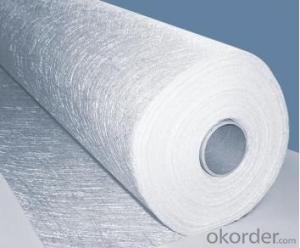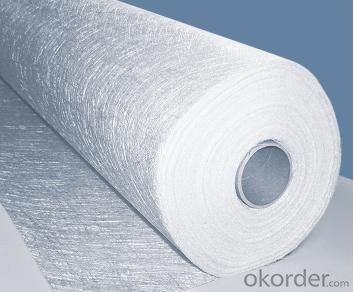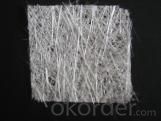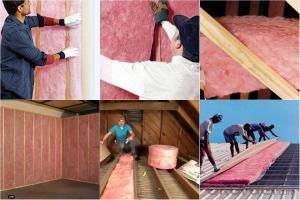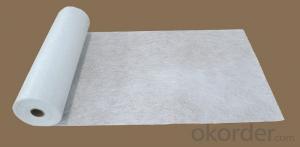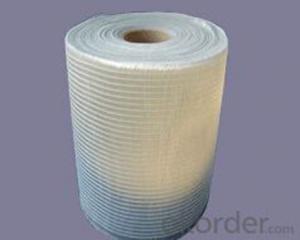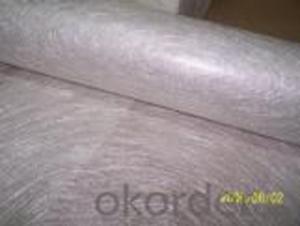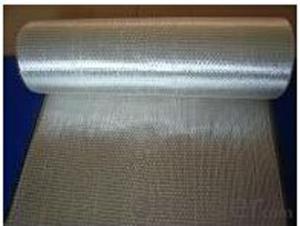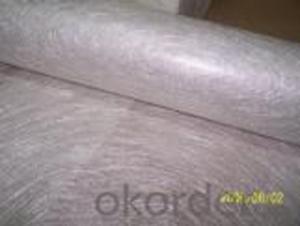Fiberglass Mat Tissue - Stitch Chopped Strand Mat 450gsm, 50-2400mm
OKorder Service Pledge
OKorder Financial Service
You Might Also Like
Description:
Fiberglass stitch chopped strand mat is the mat made of fiberglass roving which is at first be cut into certain length and evenly unfolded in all directions and then stitched with polyester yarn.
Properties
• Fiberglass no certain direction, good homogeneity.
• No powder or emulsion; sink quickly and easy to operate
• High tensile strength, easy to operate
• Good impact strength of finished products
Applications
Mainly be used as reinforced materials in the composite material industry.
• Matrix: unsaturated polyester resin, vinyl ester resin, epoxy resin and phenolic resin etc.
• Craft: winding, pultrusion, RTM, molded, hand lay up, etc.
• Ultimate products: Liner layer of tube, pultruded profiles, FRP body of boat, insulation board
Specifications
Fibre type | Areal weight | Width | |
(g/㎡) | (mm) | ||
EMK 300 | E-Glass | 300 | 50-2400 |
EMK380 | E-Glass | 380 | 50-2400 |
EMK450 | E-Glass | 450 | 50-2400 |
CMK 300 | C-Glass | 300 | 50-2400 |
CMK380 | C-Glass | 380 | 50-2400 |
CMK450 | C-Glass | 450 | 50-2400 |
Packaging: Wrapped in PVC and placed within a cardboard carton. | |||
Image:
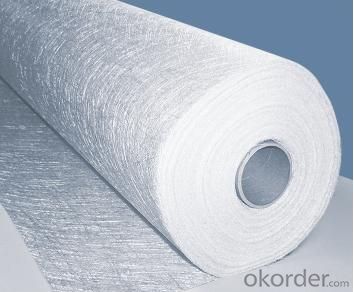
FAQ:
1. Why Choose us?
CNBM is a stated own company, provide the guarantee for the best quality, best service and safety business.
2. How will we guarantee the quality?
a, ISO 9001-2008 quality control system;
b, Strict and regular quality control in production;
c, Inspeciation when loading into container before shippment;
d, Sample stock for one year for quality tracing and record.
3. What is your MOQ?
Our MOQ is one pallet.
4. Can you provide sample?
Yes, samples are in stock. we can offer free sample for you.
5. Payment terms?
We can accept L/C, T/T etc.
6. Do you offer OEM service?
Yes, we can print customers’ logo on the packaging;
And the size and specification can be produced and design according to your demand.
7. What is the Production Lead Time?
1 *40HQ each day.
- Q: What is the tear resistance of fiberglass mat tissue?
- The ability of fiberglass mat tissue to withstand tearing or ripping when exposed to mechanical stress or force is referred to as its tear resistance. Due to its strong and durable nature, fiberglass mat tissue is renowned for its high tear resistance. This tear resistance is typically quantified and reported as tear strength, which measures the force needed to tear the material. The determination of tear strength involves standardized testing methods like the Elmendorf tear test or the tongue tear test. Various factors, including thickness, density, and composition, can influence the tear resistance of fiberglass mat tissue. Nevertheless, fiberglass mat tissue generally exhibits outstanding tear resistance properties, making it an excellent choice for applications where durability and strength are crucial, such as in the construction industry for reinforcement materials or in the production of composite materials.
- Q: Is fiberglass mat tissue suitable for insulation in cold storage facilities?
- Fiberglass mat tissue can be a suitable insulation material for cold storage facilities. Fiberglass is known for its excellent thermal insulation properties, which can effectively prevent heat transfer and maintain low temperatures in the storage area. Additionally, fiberglass is resistant to moisture and does not absorb water, which is important in cold storage facilities where condensation and moisture can be prevalent. The fiberglass mat tissue can be easily installed and provides a cost-effective solution for insulating the walls, ceilings, and floors of cold storage facilities. Overall, fiberglass mat tissue can effectively contribute to maintaining the desired cold temperatures and preventing any thermal leaks in these facilities.
- Q: How does fiberglass mat tissue compare to other types of insulation materials?
- Fiberglass mat tissue offers several advantages over other types of insulation materials. Firstly, it has excellent thermal insulation properties, making it highly effective in reducing heat transfer and maintaining a comfortable indoor environment. Additionally, fiberglass mat tissue is lightweight, easy to handle, and can be easily installed in various applications, such as walls, roofs, and floors. It is also resistant to moisture, mold, and pests, ensuring long-lasting performance and durability. Moreover, fiberglass mat tissue is cost-effective and provides great value for money due to its high efficiency and low maintenance requirements. Overall, fiberglass mat tissue stands out as a reliable and efficient insulation material in comparison to others available in the market.
- Q: What is the density of fiberglass mat tissue?
- The density of fiberglass mat tissue may differ depending on its specific type and manufacturer. On average, it has a density of approximately 1.5 g/cm³ or 1500 kg/m³. It should be emphasized that the density might slightly vary depending on the thickness and composition of the fiberglass mat tissue.
- Q: Does fiberglass mat tissue provide good moisture control?
- Fiberglass mat tissue does provide good moisture control. It is a widely used material in construction and insulation applications due to its excellent moisture resistance properties. The composition of fiberglass, which is made from fine fibers of glass, allows it to repel moisture effectively. This characteristic makes fiberglass mat tissue a suitable choice for areas where moisture control is important, such as in walls, roofs, and ceilings. Additionally, fiberglass mat tissue is often used as a vapor barrier, preventing the passage of water vapor and further enhancing its moisture control capabilities. Overall, fiberglass mat tissue is known for its ability to provide good moisture control, making it a reliable option in various construction and insulation projects.
- Q: Can fiberglass mat tissue be used in wet environments?
- Indeed, wet environments can indeed accommodate the utilization of fiberglass mat tissue. This specialized material has been ingeniously engineered to possess an inherent resistance to moisture, thereby enabling it to endure prolonged exposure to water. Consequently, this remarkable attribute renders it highly suitable for deployment in various sectors, most notably construction, marine, and automotive industries. These particular domains frequently necessitate the deployment of components or structures that inevitably encounter water, humidity, or moisture. The material's unparalleled resistance to water impeccably guarantees the preservation of its structural robustness and ensures that it remains impervious to degradation or any diminishment in its performance properties even when confronted with damp conditions.
- Q: Can fiberglass mat tissue be used for reinforcing swimming pools?
- Swimming pools can be reinforced with fiberglass mat tissue, a robust and enduring material widely employed in diverse construction projects. This lightweight and flexible material is highly resistant to water, chemicals, and corrosion, making it an excellent option for reinforcing swimming pool structures. To apply the fiberglass mat tissue, it is typically affixed to the pool surface using a resin-based adhesive, resulting in a powerful bond that enhances the pool's strength and stability. Furthermore, the use of fiberglass mat tissue can effectively deter cracking and increase the lifespan of the swimming pool, rendering it a favored choice among pool builders and owners.
- Q: Does fiberglass mat tissue provide any acoustic insulation?
- Fiberglass mat tissue does provide some degree of acoustic insulation. Due to its fibrous structure, it can absorb sound waves and reduce their transmission through walls or other surfaces. However, it is important to note that the level of acoustic insulation provided by fiberglass mat tissue may vary depending on various factors such as thickness, density, and the specific application. In some cases, additional layers or thicker materials may be required to achieve optimal acoustic insulation.
- Q: What is the expected lifespan of fiberglass mat tissue in sports facility applications?
- The expected lifespan of fiberglass mat tissue in sports facility applications varies depending on various factors such as maintenance, usage, and environmental conditions. However, with proper care and regular maintenance, fiberglass mat tissue can last for several decades in sports facility applications.
- Q: What is the lifespan of fiberglass mat tissue?
- The lifespan of fiberglass mat tissue can vary depending on factors such as the quality of the material, environmental conditions, and proper maintenance. However, on average, fiberglass mat tissue can last anywhere from 20 to 30 years.
Send your message to us
Fiberglass Mat Tissue - Stitch Chopped Strand Mat 450gsm, 50-2400mm
OKorder Service Pledge
OKorder Financial Service
Similar products
Hot products
Hot Searches
Related keywords
